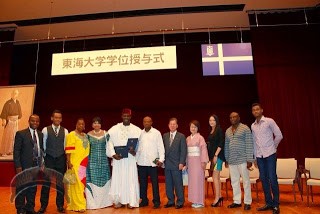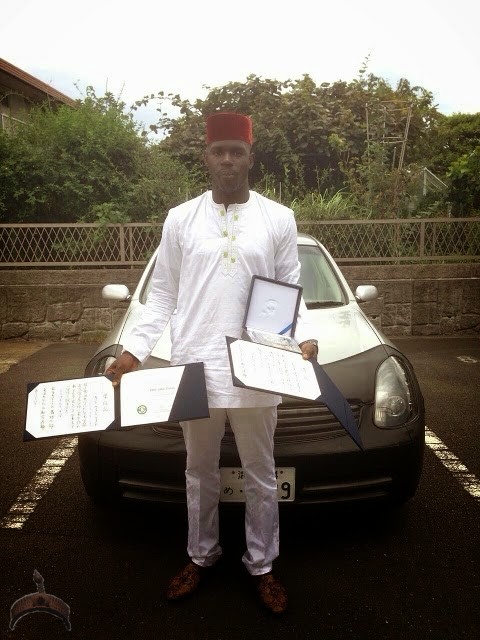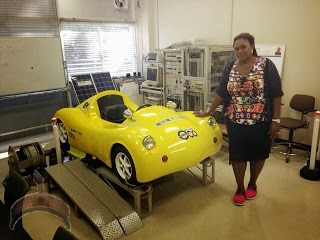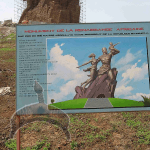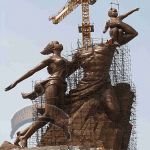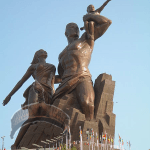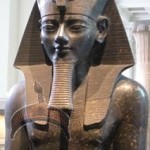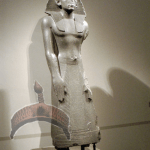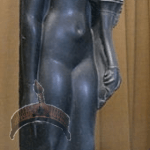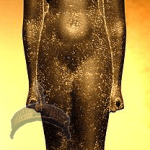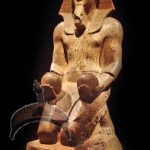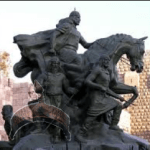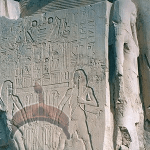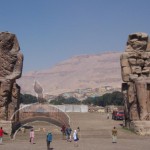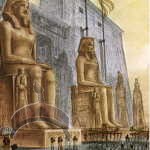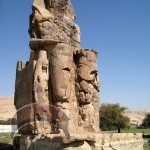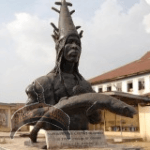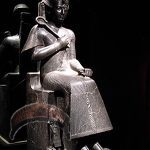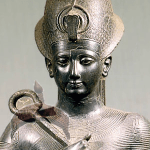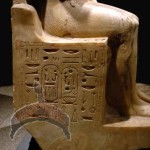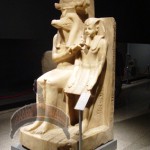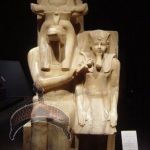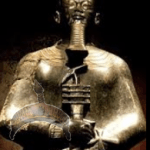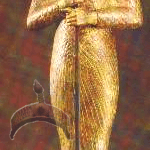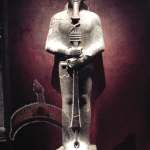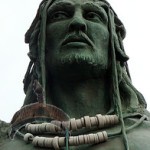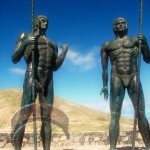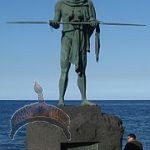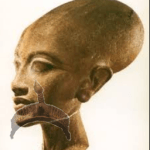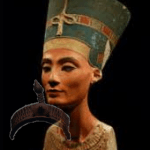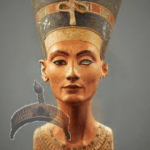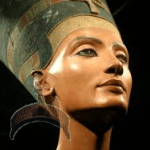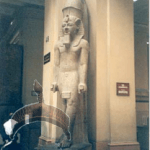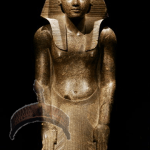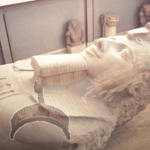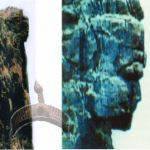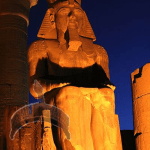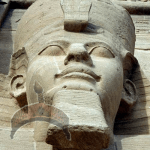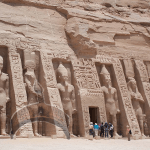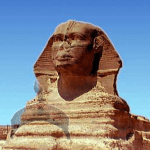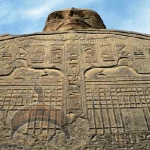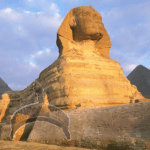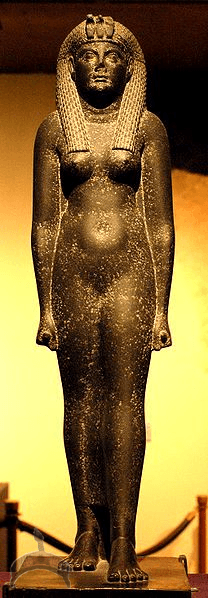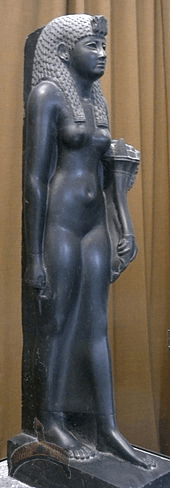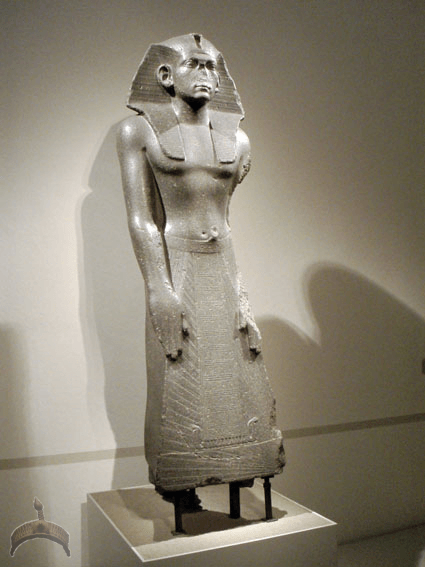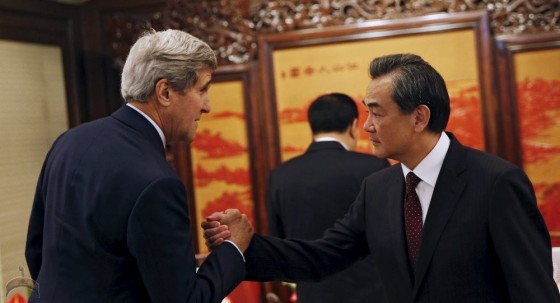Nigeria's no 1 blog for latest Nigeria Property, Nigeria House,Private Property Nigeria, Real Estate Nigeria, Lagos Island nigeria, lekki lagos real estate, arable farming land nigeria, Land for sale, to let,for sale and for rent.
Sunday, May 17, 2015
17 of Top 20 African Sculptures (Cleopatra)
Cleopatra VII Philopator (69 BC – August 12, 30 BC) was the last pharaoh of Ancient Egypt. She was a member of the Ptolemaic dynasty, a family of Greek origin that ruled Egypt after Alexander the Great’s death during the Hellenistic period. The Ptolemies, throughout their dynasty, spoke Greek and refused to speak Egyptian, which is the reason that Greek as well as Egyptian languages were used on official court documents such as the Rosetta Stone.
By contrast, Cleopatra did learn to speak Egyptian and represented herself as the reincarnation of an Egyptian goddess, Isis. Cleopatra originally ruled jointly with her father Ptolemy XII Auletes and later with her brothers, Ptolemy XIII and Ptolemy XIV, whom she married as per Egyptian custom, but eventually she became sole ruler. As pharaoh, she consummated a liaison with Julius Caesar that solidified her grip on the throne. She later elevated her son with Caesar, Caesarion, to co-ruler in name. After Caesar’s assassination in 44 BC, she aligned with Mark Antony in opposition to Caesar’s legal heir, Gaius Julius Caesar Octavianus (later known as Augustus).
With Antony, she bore the twins Cleopatra Selene II and Alexander Helios, and another son, Ptolemy Philadelphus. Her unions with her brothers produced no children. After losing the Battle of Actium to Octavian’s forces, Antony committed suicide. Cleopatra followed suit, according to tradition killing herself by means of an asp bite on August 12, 30 BC. She was briefly outlived by Caesarion, who was declared pharaoh by his supporters, but he was soon killed on Octavian’s orders. Egypt became the Roman province of Aegyptus.
To this day, Cleopatra remains a popular figure in Western culture. Her legacy survives in numerous works of art and the many dramatizations of her story in literature and other media, including William Shakespeare’s tragedy Antony and Cleopatra, Jules Massenet’s opera Cléopâtre and the 1963 film Cleopatra. In most depictions, Cleopatra is put forward as a great beauty, and her successive conquests of the world’s most powerful men are taken as proof of her aesthetic and sexual appeal. In his Pensées, philosopher Blaise Pascal contends, evidently speaking ironically because a large nose has symbolized dominance in different periods of history, that Cleopatra’s classically beautiful profile changed world history: “Cleopatra’s nose, had it been shorter, the whole face of the world would have been changed.”
15 of Top 20 African Sculptures (Amenhotep II)
15) Sallah Ad Din (Saladin)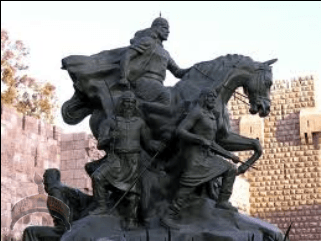

Ṣalāḥ ad-Dīn Yūsuf ibn Ayyūb (1138 – March 4, 1193), better known in the Western world as Saladin, was a Kurdish Muslim, who became the first Sultan of Egypt and Syria, and founded the Ayyubid dynasty. He led Muslim and Arab opposition to the Franks and other European Crusaders in the Levant. At the height of his power, his sultanate included Egypt, Syria, Mesopotamia, Kurdistan, Hejaz and Yemen. Under his personal leadership, his forces defeated the Crusaders at the Battle of Hattin, leading the way to his re-capture of Palestine, which had been seized from the Fatimid Egyptians by the Crusaders 88 years earlier. Though the Crusader Kingdom of Jerusalem would continue to exist for a period, its defeat at Hattin marked a turning point in its conflict with the Muslims and Arabs. As such, Saladin is a prominent figure in Kurdish, Arab and Muslim culture. Saladin was a strict adherent of Sunni Islam. His chivalrous behavior was noted by Christian chroniclers, especially in the accounts of the Siege of Kerak, and despite being the nemesis of the Crusaders, he won the respect of many of them, including Richard the Lionheart; rather than becoming a hated figure in Europe, he became a celebrated example of the principles of chivalry.
16)Amenhotep II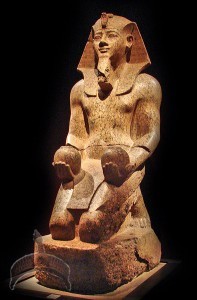
Amenhotep II (now and again read as Amenophis II and significance Amun is Satisfied) was the 7th Pharaoh of the 18th administration of Egypt. Amenhotep acquired a limitless kingdom from his dad Thutmose III, and held it by means of a couple of military battles in Syria; nonetheless, he battled substantially less than his dad, and his rule saw the compelling end of dangers in the middle of Egypt and Mitanni, the significant kingdoms competing for force in Syria. His rule is normally dated from 1427 to 1401 BC.
Different tactics Nigerian banks use in defrauding customers
Francis Agadaga still remembers events of that fateful evening. He could have been a widower by now. On September 12, 2014, he rushed to an Automated Teller Machine point in his neighbourhood at Igando, a Lagos suburb, to pick some cash with which to take his ailing wife, Sandra, to the hospital. It was a tough period for the family. The N7, 850 left in his bank account would go a long way in dousing the situation if he could get access to the fund. After inserting his card into one of the ATMs and requesting to withdraw N7, 000, what followed almost left the father of two in tears.
“It was on a Sunday afternoon and we had just returned from church when my wife started feeling feverish,” he began. “Her temperature became so high that we needed to quickly rush her to a hospital. I didn’t have any money on me at the time and so I hurried to the nearest ATM point to withdraw the little money I had in the account.
“However, to my utmost shock, I got a debit alert but did not get any money from the machine. I was so confused and tensed because I had never experienced such before and the kind of situation on ground then was a matter of life and death,” he said.
After waiting for a while to see if the cash would pop out of the machine, Agadaga left the place heartbroken and more tensed than he ever was. It took the kindness of few neighbours and friends to raise the money needed to save his wife’s life at a private clinic she was rushed to for treatment.
“It was my neighbours and friends who helped to raise N8, 000 with which I took her to the hospital where she was given injections and drugs. The next day, I went to my bank to complain and bank officials promised to reverse the debit after I had filled a form.
“I went back there after about a week later to find out why the money had not been reversed as promised. I was told their system had some technical problems, which they were trying to fix. I decided to give them some more time for the problem to be rectified. But after going there several times and being told the same thing, I left everything to God.
“Since that period till now, my N7, 000 has not been refunded. If not for my neighbours and friends who helped with some cash that day, maybe my wife could have died from that sickness,” the disgruntled young father toldSaturday PUNCH.
Like Agadaga, Ejiro Dumuje, is still waiting for her money to be reverted back to her account four months after she was wrongly debited by an ATM in Abeokuta, the Ogun State capital. Dumuje had visited the ancient city to purchase bales of Adire fabric to resell in Edo and Delta states where she shuttles frequently when she suddenly ran out of cash. She headed for the nearest ATM point to collect some money. After paying her initial request of N40, 000, the young lady decided to pick additional N5, 000 from the machine. That was where things went wrong. A debit alert was sent to her phone but the machine never paid that money. Four months on, Dumuje is still waiting after several complaints at her bank.
“I have been to my bank more than three times to complain and ask why my money has not been refunded,” she said. “The people at the customer care just try to calm me by assuring that the case was still under investigation and that a refund would be effected as soon as possible. This is the fourth month and I have not seen my money. I am tired of going to complain. If they like, they can pay and if not, I leave them to God,” the visibly enraged lady said.
Bayo Odesina was in his office in Lagos in December 2013 when he got a debit alert of N250, 000 on his phone. It was an alert for an online transaction carried out through his MasterCard in Flushing, New York, United States of America. Agitated by the development, Odesina phoned his account officer to complain about the development and followed it up by contacting his lawyers to write the bank.
The financial institution replied and asked for a three-month period to properly investigate the matter. After three months, the bank sent a letter to Odesina’s home, accusing him of negligence and carelessness for the act. According to the bank, he had compromised the Personal Identification Number of his ATM card, thereby allowing fraudsters access to it in the process. Meanwile, it was only a few days after Odesina had approached his bank to block his ATM card after it went missing. The bank simply absolved itself of any blame in the act.
Odesina’s lawyers wrote the bank again, threatening to take the matter to court if their client’s money was not refunded. In response, the bank requested for more time, apparently trying to frustrate the matter. One year passed and nothing changed. Odesina, a media practitioner, wrote the bank’s corporate affairs unit, this time, introducing himself as a journalist and highlighting how much damage a publication of the matter could do to the bank’s image. That same day, he was contacted by the head of the corporate affairs unit, who strongly assured him that his money would be refunded in a few days time after talking him out of publishing the matter in the newspaper where he worked. Three days later, an alert did come on his phone. His money had been refunded after about 13 months of intense struggle.
“Their plan was to make me forget about the money,” Odesina told Saturday PUNCH earlier in the week. “They kept using all sorts of delay tactics just to frustrate me so I could give up on the money. If it were N5, 000, maybe I would have forgotten about it, but N250, 000 is not something I could just let go like that because it was a lot of money.
“My only saving grace was that I am a journalist. The bank already accused me of being careless with my ATM PIN. They also said that I had released vital information of the card to fraudsters who then went ahead to make online purchases with it in the US. The card in question had got missing and I made a request for it to be blocked, so how could that same card be used to make any transaction if not through the help of an insider in the bank who knew how to bypass certain security systems put in place?
“When I realised that the bank was not going to pay my money back, I contacted the people at the corporate affairs unit and made them understand what damage a news of the entire drama could do to the image of their bank. That same day they called me and pleaded with me to give them a few days and that they would pay me back my money. Three days later, I got an alert of N250, 000 on my phone. That was one year and one month after the initial incident. Imagine if that was all I had in the bank or I had not pursued the matter vigorously, I could have lost that much to the bank. I have since closed down my account with the bank,” he said.
A young factory worker in Akure, Ondo State, Yemi Onanuga, was stunned recently when N11, 300 was deducted from his account by his bank for an insurance scheme the financial institution claimed he subscribed to earlier. The money was part of funds he had been saving for months to establish a salon.
“I was shocked when I received the debit notification because I never subscribed to any insurance scheme at any period. It took several months of complaint and repeated visits to the bank before my money was paid back into my account. It was a terrible experience that really affected me in several ways,” Onanuga toldSaturday PUNCH.
Illegal deductions as these are now a common feature despite series of complaints from many bank customers across the country. While some have been lucky to have their funds returned into their accounts, others continue to lament in vain. For them, it is a refund that might never come.
Three weeks ago, Amarachi Ejindu went to an ATM at the Akowonjo area of Lagos to withdraw some money. Though, her money was reversed back after receiving a debit alert initially for the transaction, the N65 ATM charge was not. It took a while before Ejindu noticed this and when she did, no reasonable explanation came to her mind. Why should she be charged for a transaction that was never completed or even occurred, she wondered. Why was the N65 not refunded along with the amount reversed? Who does that money go to? What does the CBN say about this? The questions kept running on her mind.
“I was really concerned about this that I had to call my bank’s customer care on the phone,” Ejindu opened. “It is a small amount but then I imagined why I should be charged for a transaction that never took place. It sounded like a rip off to me. I called the customer care people and they could not give a satisfactory explanation for this. They told me to make a formal complaint and that the matter would be looked into. I did that but they have yet to refund that money. Indeed, N65 could look like a small amount but think about how many customers would have experienced the same problem in a day and then see how much the banks could be making off people without their knowledge,” she said.
In Ilorin, the Kwara State capital, Abdullahi Lawal, an undergraduate, did not also get his N65 back after a cash reversal on his account two months ago. It was on a Friday evening and the 23-year-old had visited a cash point in the city to pick some amount to transport him to Ibadan in Oyo State where a cousin was getting married that weekend. During the transaction, Lawal was debited N4, 000 which was soon reversed back into his account. Like Ejindu, he noticed that what came back to him was N65 less. There was nobody he could complain to, so he forgot about the matter and moved on.
“When I noticed that N65 was still missing from my account after the reversal, I decided to let go as it was a small amount and moreover, there was nobody I was going to complain to that day. If it were a bigger amount, of course I would have gone to the bank to complain. I have forgotten about it because I am not sure the bank will refund the money,” Lawal said.
Apart from the N65 ATM charge, customers are also made to pay for multiple Short Message Service alerts for a single transaction on their bank accounts, losing more of their funds in the process. Many of these charges are not even communicated to the unsuspecting customers by the financial institutions.
A social economist, Kabiru Tiamiyu, told Saturday PUNCH that with all kinds of deductions being carried out in the name of charges by Nigerian banks, it is almost impossible for customers, especially those running savings accounts to get back the exact amount they kept in the banks.
According to Tiamiyu, one of the easiest ways banks milk unsuspecting customers is through SMS. He said banks still charge N4 per SMS sent to a customer when even bulk SMS providers in the country offer the service for less than N1.00. Rip-off of this kind, he said must be resisted by customers.
Following a directive by the Central Bank of Nigeria, bank customers began paying N65 for cash withdrawals made on other banks’ ATMs from September 1, 2014. The re-introduction of the charges came almost two years after the CBN and the Deposit Money Banks cancelled the N100 ATM charge in December 2012. According to the apex bank, the charge would become effective on the fourth ATM withdrawal in a month, thus making the first three withdrawals on other banks’ machines within the month free.
But financial experts think that the N65 deduction should only apply to valid withdrawals. According to Godfrey Obiefule, an investment banker, returned cheque debits, bank-generated charges and loan liquidation are transactions that ought not to attract Commission on Turnover. He posited that reversals or mistakes made by banks should not attract charges to the depositors.
In 2013, the CBN disclosed that it recovered over N9bn excess charges deducted from customers’ accounts by commercial banks across the country within a one year period. The controller of the Abeokuta branch of the apex bank at the time, Mr. Olumuyiwa Joawo, made the revelation during a consumer sensitisation workshop organised by the financial body in the Ogun State capital.
Head, Security and Risks Management, Credit Dynamics, Kingsley Ochefu, wants customers to be more vigilant in their dealings with financial institutions and always complain whenever they notice any discrepancies on their accounts.
“Banks should let their customers know their service charges for accounts.
Deputy Chairman, Committee of E-banking Industry Heads in Nigeria, Mr. Dele Adeyinka, toldSaturday PUNCH that the N65 ATM charge is shared by several parties regardless of whether the transaction succeeds or not.
“The N65 in question is shared by several parties. Out of the amount, N10 goes to the issuer of the card while N55 goes to the bank that owns the machine.
“The truth is that whether a dispense error occurs or not, there has been a communication link, the switch has been touched and the owner of the ATM incurred some cost to set up the machine. That communication has to be paid for because there are implicating charges for the process involved.
“For a customer such could be a failed transaction but in the real sense a communication link between the ATM and your bank had occurred, switch had been touched and these services attract charges whether or not the request was eventually completed. A service has been offered technically.
“But this is the fault of nobody. It is simply as a result of infrastructural failure in our society. Banking transactions rely on a lot of infrastructure to thrive especially stable power supply. This is part of the reasons why the situation persists,” he said.
On the issue of charging customers for multiple SMS on a particular transaction, Adeyinka said it was wrong for banks to do such as it was not the fault of the customers. According to him, customers who experience such should make formal complaints at their banks or petition the CBN who would surely look into it.
CBN spokesman, Mr. Ibrahim Muazu, told Saturday PUNCH that whoever feels cheated by their bank should write the regulatory financial institution and their grievances would be looked into immediately if the case is valid. Like Adeyinka, he explained why the N65 ATM charge does not return back to a customer’s account even when a transaction is not completed. He disclosed that as long as a communication link has had been established between the two banks involved, charges are definitely going to apply.
Pics: Actress Uche Ogbodo shares photos to celebrate her birthday

Nollywood on-screen character and mother of one, Uche Ogbodo shared these photographs to mark her birthday today. Happy birthday to her. More photographs bellow.


The USA wants from Russia the impossible
The visit of John Kerry looks like an attempt to tune down the conflict with Russia. The US is ready to admit the failure of the policy of “isolating Russia” and is looking for ways to back down.
Without relinquishing the goal of containment of Russia, it wants to make it less obvious, as it was before, counting in return on Moscow cooperation on key geopolitical issues.
US Secretary of State Kerry occupies fifth place in the official American power hierarchy – that is, he is fourth in line to take the place in the White House should anything happen to the President (after the Vise-President and Speakers of House and Senate). However, in the real power hierarchy 71 years-old John Kerry, former Presidential candidate, who belongs on his mother’s side to the one of the most influential American oligarchic families Forbes (he is also married to the billions of ketchup “Heinz”), is positioned even higher.
Kerry – he is that hereditary Anglo-Saxon elite that governs the USA (it is not by accident that he is related to another dynasty – Bushes). His pale counterpart in the current administration is Vise-President Biden. In the administration of inherently weak president Obama the foreign policy was the prerogative of experienced and qualified people – Biden, Hillary Clinton, Kerry. Biden and Kerry worked together for a long time in the Committee on Foreign Relations in the Senate (both were Heads of that committee), and Clinton, although she was less versed in the world affairs, spent eight years in the White House and worked as long in the Senate commission for Security and Cooperation in Europe.
Of course, if Obama unexpectedly had turned out to be a strong President (although he was not elected for that) with his own geopolitical if not strategy but, at least, tactics, then his impact of the US foreign policy would have been decisive. But as things stand, he has become the first among equals, dependent on his more experienced associates.
This situation revealed itself quite clearly in the relationships with Russia. First, Clinton and Biden were directing the game. The former distinguished herself by the Freudian error with “peregruzka”, and the latter – by the clearly stupid attempt to interfere openly into the internal affairs of Russia trying to split the Russian elites and betting on the Medvedev’s re-election. As a result, by the beginning of the Obama’s second term in 2013 our countries found themselves on the brink of a cold war.
After Kerry had become the Secretary of State, he only had time to visit Moscow and talk to Putin once – in May of 2013, after which the events began to unfold at kaleidoscopic speed: the flight of Snowden and asylum granted to him by Russia, the US gamble in Syria (where Obama nevertheless put his foot down stopping the invasion – mostly thanks to the firm position of Putin), the turning of Yanukovich away from Eurointegration.
By early 2014, the confrontation of the US and Russia over Ukraine seemed to have reached the highest level, but that was just the beginning. After the mission of the three European foreign ministers in Kiev, Obama asked Putin to persuade Yanukovich to make a deal with the opposition. Putin agreed, but the very next day, after the coup, the Americans forgot about the agreement.
The relationship between the leaders of the two countries essentially collapsed. Putin lost trust in Obama, and the subsequent events in Crimea demonstrated that Russia was not prepared to silently watch the US/NATO swallowing Ukraine. Furthermore, Russia challenged the whole concept of the American-style world order, switching from defense to the coordination of efforts of all countries and forces desirous of changing the rules of the global game, from China to Latin America. An attempt to name Russia as an aggressor and organize its isolation was a natural reaction for the US – those that rise against the right of America to determine what is right and what is wrong should be severely punished.
Was it understood in Washington in spring of 2014 that the isolation of Russia would not succeed? No, and it took Washington a year to realize that.
Kerry’s visit symbolizes an admission of that very fact – we could not do anything with you, however hard we tried. Let us somehow reach an agreement that we would not go for a global confrontation on all issues but, rather, set the Ukraine problem aside and try to find common ground with regard to other problems. Brazen? Undoubtedly, but the elite of the nation that considers itself indispensable and in charge of the global mission is unable to think or act otherwise. We will strangle you with one hand, but let us use the other hand for cooperation – this is the expression, I believe, Putin used last year to describe the American attitude. What changed after the visit of the Secretary of State?
Kerry came to make the Russian President understand – we are ready to pretend that we are not strangling you and even lessen the grip a bit, but in return we want to talk about Syria, Iran, caliphate, North Korea, and other things important to us. And about Ukraine, of course – give us the guarantees that you would not annex it, and we will forget about Crimea and promise not to admit Ukraine to NATO.
Obviously, Kerry did not say any of this in so many words, but it was important for him to understand whether Russia is serious about its struggle against the American global hegemony (from finances to ideology, from China to Middle East) or it is simply bluffing in order to scare the US and gain concessions on Ukraine, forcing the US to back off from it. This is an example of the typical American logic, but that is how the US views the international relationships: the weak Russia cannot be so bold.
You are weak, you lost the Cold War, you do understand, do you not, that we will never allow you to reintegrate the post-Soviet space – where do you think you are pushing in with your Russian world, Eurasian union and anti-globalist ambitions? Kerry as well as Clinton and Obama held precisely such view of Russia a year ago, and this year has not made them change their minds. But it forced them to start thinking, at least – the events were indeed developing in a rather unfortunate way.
During the year of “isolation” of Russia, the political position of the US failed to improve – instead, it keeps worsening for both objective and subjective, i.e. attack at Russia, reasons.
First, the situation in the Middle East is becoming more and more difficult and anti-American. Through its actions, the US unintentionally has created chaos and is unable to extricate itself from it or solve the numerous problems. The growth of the caliphate, strained relations with almost all allies in the region, a boiling mess in Afghanistan, the Iranian labyrinth. Russia is supporting Syria, establishing closer relations with Iran and Egypt, approaching Pakistan, and looking closely at Afghanistan.
Second, forcing Europe to keep the anti-Russia sanctions in place allowed, on the one hand, to rein in the Old World elites, but on the other hand – increased the anti-American sentiments on the continent, so that it will not be possible to keep the cross-Atlantic solidarity for much longer. Soon, the discussion about the extension of the sanctions is to take place that has a chance of splitting the EU – Europe openly wishes the confrontation with Russia to end. The breakdown of the unified European front would be a severe blow to the US reputation; that is why, in anticipation of possible loosening of the sanctions, Washington is in a hurry to proclaim this, via Kerry’s visit, as its own initiative (naturally, such action would be presents as: “the sanctions have achieved their effect forcing Russia to refrain from escalating the war in Ukraine”).
Third, the relations between Russia and China are expanding so fast that it causes serious anxiety among Ango-Saxon strategists. Washington is losing to Beijing the competition for the Pacific region, and the tandem of Putin and Xi could not only mean the establishment of the Russia-China alliance, but could also become the platform for building the ram that will destroy the very foundation of the Ango-Saxon power – the world financial system based on the dollar as the global reserve currency. The US still has the strength to block the reform of the IMF but this only increases the risk of finding out later on that nobody is interested in such a reform anymore, since a parallel global financial architecture has already been formed.
As a special bonus of this year of Russia’s “isolation”, the whole world (including even Western anti-Atlantists) came to view Putin as the symbol of resistance to the American dominance. This perception first emerged at the time of the Snowden story but has solidified after the sanctions and blockade. Such perception, by the way, plays a significant psychological role in the geopolitical struggle – the presence of such a symbol opens up novel venues in the fight against the hegemony.
Kerry came to try to gauge the strategic goals of Putin. Not just in Ukraine (will or will not annex) but in general, the global far-reaching aims. And to evaluate whether there are symptoms that this “mysterious Russian” in his heart of hearts has no problem with globalization, but simply wants to secure a position for himself in the club of those ruling the “golden billion” and for his country – a dignified place among Western countries. And whether the Russia’s turn towards the East is just a smokescreen for the West in order to raise the stakes.
I do not know what Kerry saw in Putin’s eyes (he, unlike Hillary Clinton, has never said that “the KGB agent has no soul”) but something tells me that the lieutenant colonel behaved in a way to make the best possible impression on the Yale graduate. So that later Kerry together with Biden and Obama (and with Hillary – she might be taking over, after all) would try to solve the non-existing for the Russians “Putin enigma” puzzling over it and wasting time (working against the USA) in search of options: what could we offer in exchange, what could we do to reach a deal with the Russians about “local cooperation” and at the same time keep Ukraine for ourselves?
The idea that this is impossible in principle, that Putin will not give up his goal of reforming the unipolar world even after Ukraine has returned to the Russia’s orbit would never ever enter their minds. Their very Anglo-Saxon minds.
Source: http://vz.ru/politics/2015/5/13/745112.html
Dencia flaunts outside pics of her LA mansion!
She shared the photographs on her imstagram page, saying she was on her way to the air terminal to catch a flight to Vegas. You can see her pink Range out of sight. The house looks gigantic.
Another pic bellow.
₦4.5m Fraud: Court Jails Man 7 Years
The Economic and Financial Crimes Commission, EFCC, on Thursday, May 14, 2015, secured another conviction, as one Ofonome S. Enukora was sentenced to seven years imprisonment without an option of fine by Justice I.B. Gafar of the Federal High Court sitting in Awka, Anambra State.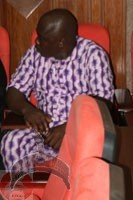
The convict had earlier been arraigned on February 12, 2015 on a two-count charge bordering on obtaining money by false pretence to the tune of N4, 500,000( Four Million Five Hundred Thousand Naira).
Though the convict was discharged and acquitted on the first count, he was found guilty of the second count and was sentenced to seven years.
He was also ordered to pay the sum of N4, 500,000( Four Million Five Hundred Thousand Naira) to the complainant.
Meanwhile, the Commission today arraigned one Emmanuel Ade Toluhi before Justice Bello Kawu of the FCT High Court, Kubwa, Abuja on a two-count charge of fraud.
One of the charges read: “That you Emmanuel Ade Toluhi sometime in 2009 in Abuja within the Judicial Division of the FCT High Court committed criminal misappropriation to wit: dishonestly converted to your own use the sum of Two Million Naira being the payment for the unlawful sale of a two bedroom uncompleted flat situated at No 218A F.C.D.A Estate Zone B, Angwan Mada Gidan Mangoro, along Jikwoyi-Karshi FCT Abuja belonging to one Alfred Ayodeji Ogbonda and thereby committed an offence contrary to Section 308 of the Penal Code Law cap 532 Laws of the Federation of Nigeria 1990 Abuja and punishable under section 309 of the same law.”
The accused person, however, pleaded not guilty.
Justice Bello Kawu adjourned the case till May 15, 2015, for consideration of bail application and ordered the accused person to be remanded in prison custody.
Media & Publicity
14th May, 2015
See How Much Our Ministers, Senators, Reps, Special Advisers Earn
Senators and members of the House of Representatives that will constitute the 8th National Assembly and ministers to be appointed by President-elect, Gen. Muhammadu Buhari (retd.), will on assumption of office receive welcome perks amounting to ₦9 billion.
The perks of office include the housing allowance which each of the incoming office holder is entitled to receive once a year, the furniture allowance which they are entitled to once in four years and motor vehicle loan which they are entitled to once in their tenure.
The perks are some of the non-regular allowances that the political office holders are entitled to as prescribed by the Revenue Mobilisation, Allocation and Fiscal Commission (RMAFC).
There are other allowances, both regular and irregular ones, but housing, furniture and motor vehicle are paid at the beginning of the tenure of the office holders to ensure that they settle down appropriately.
Housing allowance for the political office holders is 200% of their annual salaries; furniture is 300% and motor vehicle loan is 400%.
The eighth National Assembly will be inaugurated by Buhari on June 5 after the expiration of the tenure and dissolution of the 7th National Assembly on the same date.
Membership of the eighth National Assembly include 109 senators and 360 members of the House of Representatives elected on the platform of different political parties from across the country.
Investigation showed that each senator would be paid ₦4,052,800 on the assumption of office as housing allowance. They will also be paid the same amount every year because the housing allowance is on annual basis.
This means that 107 senators will be paid a total of ₦433,649,600 as housing allowance annually.
The Senate President and the Deputy Senate President are not entitled to this allowance because their own accommodation is to be provided by the Federal Government.
Similarly, each member of the House of Representatives will be paid ₦3,970,425 as housing allowance on assumption of office.
This means that the 358 representatives will be collecting a total of ₦1,421,412,150 as housing allowance.
Again, the Speaker and Deputy Speaker of the House of Representatives are excluded from this allowance as the Federal Government is to provide their own accommodation.
Following the monetisation of entitlements of public officials, the lawmakers lost the right to occupy houses built and maintained by the government. Consequently, the Federal Government sold the houses previously occupied by the lawmakers to them.
The principal officers of the National Assembly also benefited from the sale of the houses. As a result, the Federal Capital Territory Administration is at present building new houses for the lawmakers that will emerge as the Senate President, the Deputy Senate President, the Speaker and the Deputy Speaker.
For furniture, each of the senators is to get ₦6,079,200. The furniture for both the Senate President and his deputy are to be fully provided by the government. This means that 107 senators will get a total of ₦650,474,400 as furniture allowance. Furniture allowance is paid once in four years.
Each member of the House of Representatives will be paid ₦5,955,637.50 as furniture allowance. This means that 358 representatives will collect a total of ₦2,132,118,225 for furniture.
For vehicle, each of the senators is entitled to ₦8,105,600 while each representative is entitled to ₦7,940,850.50. This means that 107 senators will collect ₦867,299,200 for vehicle while 358 representatives will collect ₦2,842,824,479 for the same purpose.
The allowance for vehicle had been controversial. According to RMAFC, this allowance payable once in four years is a loan for any member that wants. This means that it is repayable.
In 2007, each senator had been given the loan to purchase vehicles. Few months after they had received the loan, the current Senate President, David Mark, demanded that the money totalling about ₦856m should be converted to grants for official cars.
Mark made the request in a letter addressed to the Chairman of the Revenue Mobilisation and Fiscal Allocation Commission.
In the letter dated November 15, 2007 and titled “Monetisation policy as it affects senators of the Federal Republic of Nigeria”, Mark said the senators were not properly briefed that the money was given to them as loan.
He said if senators had known that the money was loan, they would have had the opportunity to exercise the choice of refusal.
He therefore requested that the money should be converted to official car allowance although according to the monetisation policy of the Federal Government, only the President of the Senate and his Deputy are entitled to official cars. The funding for cars for other lawmakers had been built into their salaries which are paid on monthly basis.
RMAFC insisted that the money was a loan and could not be converted to a grant as the lawmakers’ benefits had been monetised. It is not clear how the matter ended as both parties refused to respond to media requests on the issue.
On the executive side, each minister that will serve in the cabinet of Buhari is entitled to a housing allowance of ₦3,915,160.
There are indications that the President-elect will shrink his cabinet by doing away with the ministers of state. However, there is a limit to how far he can reduce the cabinet positions. Constitutionally, each state of the federation must be represented in the cabinet.
This leaves him with at least 36 ministers as against the 42 ministers in President Goodluck Jonathan’s administration. Cumulatively, the ministers are to receive ₦140,945,760 as housing allowance.
Each minister is also entitled to a furniture allowance of ₦6,079,200. Cumulatively, this comes to ₦218,851,200. Each of them is also entitled to a vehicle loan of ₦7,830,320. This comes to a total of ₦281,891,520.
When put together, the housing, furniture and vehicle allowances payable to the lawmakers and ministers will amount to about ₦8.9bn.
Apart from these irregular allowances, there are other regular perks of office that are paid to lawmakers on a monthly basis. These include motor vehicle maintenance and fuelling. This is pegged at 75 per cent of their monthly salary.
Others are personal assistant, 25 per cent; domestic staff, 75 per cent; entertainment, 30 per cent; utilities, 30 per cent; newspapers/periodicals, 15 per cent; wardrobe, 25 per cent; house maintenance, 5 per cent; and constituency, 250 per cent.
There are other entitlements that they do not receive direct payments for but are provided and paid for by the government. These are special assistants, security and legislative aides. What this means is that those engaged in these capacities are paid directly by the government as the allowances cannot be claimed by political office holders. These allowances apply to senators and members of the House of Representatives.
Medical expenses are also borne by the government when they have need for them.
The lawmakers are also entitled to tour duty allowance, estacode (when they travel) and recess allowances. For a senator, the tour duty allowance is ₦37,000 per night; the estacode is $950 per night and the recess allowance is 10 per cent of their annual salary.
For a member of the House of Representatives, the tour duty allowance is ₦35,000 per night; the estacode is $900 per night and the recess allowance is 10 per cent of their annual salary.
The allowances for ministers vary slightly from those of the lawmakers. The allowances of the ministers include motor vehicle fuelling and maintenance – 75 per cent of their salaries. Others are personal assistant, 25 per cent; domestic staff, 75 per cent; entertainment, 45 per cent; utilities, 30 per cent; monitoring, 20 per cent and newspapers/periodicals, 15 per cent.
Their security personnel, medicals and special assistants are also provided. The tour duty allowance is ₦35,000 per night; the estacode is $900 per night and the leave allowance is 10 per cent of their annual salary.
Special Advisers and Special Assistants to the President to be appointed by the president are also entitled to housing and furniture allowances, special allowances and motor vehicle loan but it is not certain how many of these advisers Buhari is going to appoint.
The housing allowance of a special adviser is ₦3,885,750; furniture ₦5,828,625; motor vehicle loan ₦7, 771,500.
The regular allowances of a special adviser include motor vehicle fuelling and maintenance 75 per cent of their salaries; personal assistant 25 per cent; domestic staff 75 per cent; entertainment 45 per cent; utilities 30 per cent; and newspapers/periodicals 15 per cent.
Again, their security personnel, medicals and special assistants are also provided for. The tour duty allowance is ₦25,000 per night; the estacode is $800 per night and the leave allowance is 10 per cent of their annual salary.
Severance allowance is paid to each of the office holders at the end of their tenure in government.
Our correspondents had reported that President Goodluck Jonathan, Vice-President Namadi Sambo, non-returning federal lawmakers, ministers and aides to the President will collect ₦3.24bn as severance allowance.
Although political office holders in the country are among the highest paid government officials in the world, our correspondents also reported that the worry of many Nigerians is not what they earn officially but what accrues to them through self-appropriation and corruption.
Brazilian Mother Gives Birth to Her 21st Child at the Age of 51
A Brazilian lady conceived her 21st kid at 51 years old, the local portal G1 provided details on Sunday.
Doctors cautioned her about the high danger of this pregnancy, particularly giving that the moderately aged ladies experienced significant issues with circulatory strain, however it fell off well, and she conceived a baby.
Right now both the mother and her infant feel truly palatable. The infant measures somewhat more than three kilograms (six pounds) being 46.5 centimeters (one and a half feet) tall.
As indicated by the mother, she had her first tyke born at 13 years old
China Affirms Sovereignty Amid US Pressure on Island Dispute
China’s Foreign Minister Wang Yi rebuked US State Secretary John Kerry’s effort to limit what the US has called “manufacturing sovereignty” in the South China Sea.
China refused to back down to US Secretary of State John Kerry’s demands that the country stops land reclamation on islands in the South China Sea.
The United States has been increasingly critical of China’s activities in the South China Sea, which have included building up artificial islands in the area disputed by China, the Philippines, Vietnam and other countries. China does not consider the United States a party to the
land reclamation efforts on islands.
“The United States has for long turned a blind eye to some other claimants’ large-scale schemes to “manufacture sovereignty” — as senior U.S. diplomat Daniel Russel recently accused China of doing — on Chinese sovereign islands,” state news agency Xinhua said in a commentary.
French Foreign Minister Laurent Fabius was also in Beijing on Saturday to discuss climate change ahead of a summit on the issue in Paris.
Pics: Nigerian Student Breaks 50-yr Record In Japan Uni, Develops A Car & Graduates With Ist Class
A Nigerian understudy Ufot Ekong has broken a 50-yr record in Japan subsequent to graduating with 1st class degree and best general student from Tokai University in Tokyo Japan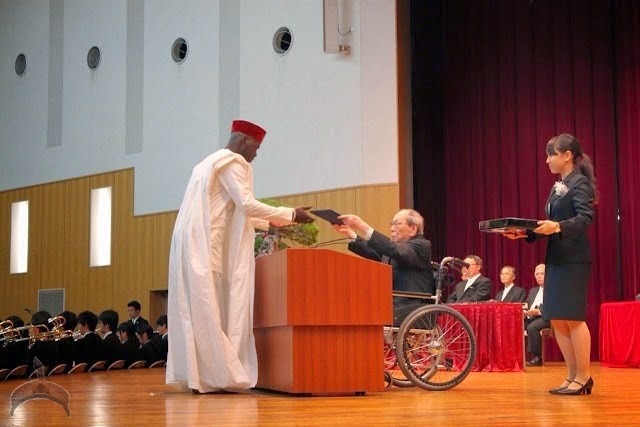
. This is the first time a Nigerian could accomplish this accomplishment since 1965.I n addition to the award,he has developed an auto to his name. He likewise won Japanese dialect language award for nonnatives and solved a scientific calculation that couldn’t be solved 30-yrs back in his first semester. Ufot Ekong is presently workin with Nissan. Here are some of this awesome achiever ,his mum’s visit to Japan , some of his awards.and the auto he developed .
